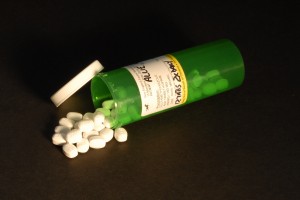Q: How do you safely and without ?adversely affecting the environment (flora, fauna, ?water supply, etc.) dispose of unused or expired medications like bute, hormones and antibiotics?
A: This is an excellent concern to raise among horse owners. Discarded antibiotics and other pharmaceuticals do have the potential to negatively impact the environment. Every state, therefore, has its own specific guidelines for handling medical waste. To learn about guidelines in your particular state, consult your Department of Natural Resources or comparable agency (different states may have different names). However, here are some general considerations and recommendations.
 Care must be taken when disposing of expired or unused medications to prevent environmental contamination. | ? Dusty Perin
Care must be taken when disposing of expired or unused medications to prevent environmental contamination. | ? Dusty PerinSome of the worst methods for disposing of unused or expired medications are pouring them down the drain, flushing them down the toilet, dropping them on the ground and tossing them directly into the trashcan. Although most horse owners deal with relatively small quantities of medications (we’re talking ounces, not gallons), even minute amounts of substances can work their way from the sewer system or landfill into the ground water, thus ?potentially impacting humans, animals and the environment.
Note: If you operate a large equine operation and handle much of the vaccination and medication administration yourself, consult your veterinarian before purchasing these products in bulk. Large quantities of medical waste material may require special permits or other restrictions.
Probably the most common disposal technique you’ll be instructed to use involves mixing the medication with an absorbent material, such as kitty litter, in a bag (plastic is fine) and then throwing it into the trash. Pills can be ground up, then dissolved in water and mixed with kitty litter and disposed of the same way.
There are also some special considerations for handling vaccines and “sharps.” Although the potential hazard of vaccines to both the environment and to humans is extremely low, they should be disposed of carefully. Inactivate any unused vaccines containing modified live viruses by mixing them with a bleach solution (1 part bleach to 9 parts water) before combining them with the absorbent material and disposing of them as described above.
Minimize the human risk of accidental punctures or infections by disposing of used needles and scalpels in a safe “sharps” container. These containers are available through most animal health supply stores, or you can make your own out of a thick (thicker than a milk jug), puncture-proof plastic container. When you’ve filled the container with sharps, seal it with heavy-duty tape and contact your state environmental office (as noted above) to find out the best way to dispose of it. Alternatively, ask your veterinarian if he would be willing to pick up your sharps during his next farm visit and dispose of them for you.
Here are some additional resources for information about the safe disposal of medications:
- The product label. Read it carefully! Many products contain detailed ?instructions on how to dispose of both the container and its contents.
- The manufacturer. Ask for explicit disposal recommendations or for the Materials Safety Data Sheet, which will include either detailed disposal instructions or resources to contact for further information. (The MSDS can often be found with a quick online search.) Some manufacturers may accept ?returns of unused (unopened) products for disposal, although not necessarily for monetary reimbursement.
- Your state veterinarian, as always, is an excellent resource.
- Your local veterinarian should be able to point you in the right direction for information, even if he or she can’t provide instructions for every medication.
The more conscientiously we dispose of any substances we use on or around our horses?from medications and liniments to disinfectants and cleaning products?the better. The ideal disposal methods may seem time-consuming at first, but armed with a little information and a bag of kitty litter, you, too, can do your part as a responsible horse owner.
For 11 years after graduating from veterinary school, Dr. Kenton Morgan worked in a private practice in Missouri and at a small breeding farm in Idaho. He then transitioned to a career in the veterinary pharmaceutical industry. Currently based in Pleasant Hill, Missouri, Dr. Morgan also chairs the American Association of Equine Practitioners Drugs and Medication Committee.
This article originally appeared in the June 2009 issue of Practical Horseman magazine.










